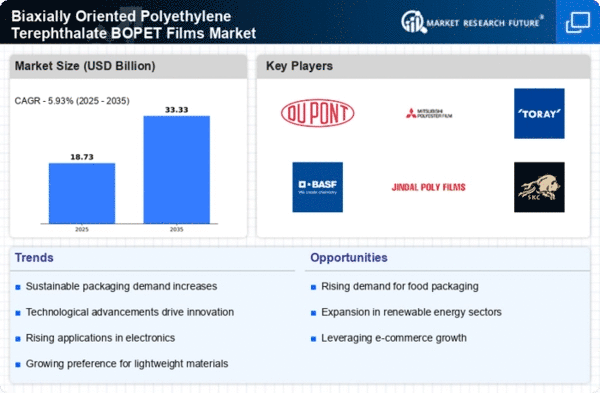Top Industry Leaders in the Biaxially Oriented Polyethylene Terephthalate BOPET Films Market

Biaxially oriented polyethylene terephthalate (BOPET) films have become a ubiquitous material in today's world, finding applications in packaging, electronics, labels, and more. The global BOPET films market is fueled by a confluence of factors like rising demand for flexible packaging, increasing consumer awareness of sustainability, and technological advancements. Navigating this dynamic landscape necessitates a keen understanding of the competitive strategies employed by key players, the factors influencing market share, and the latest industry developments.
Strategies Shaping the Market:
-
Product Diversification: Leading players like DuPont Teijin Films, Jindal Films, and Toyo Seikan are expanding their product portfolios to cater to specific market needs. This includes developing specialty films with enhanced barrier properties, printability, and sustainability features.
-
Geographic Expansion: Established players are venturing into emerging markets like Southeast Asia and Latin America, where BOPET demand is surging. This involves setting up production facilities, establishing distribution networks, and forging local partnerships.
-
Vertical Integration: Some companies are integrating backward by acquiring raw material suppliers or forward by entering the downstream conversion industry. This secures material supply, optimizes costs, and strengthens control over the value chain.
-
Technological Innovation: Continuous research and development efforts are aimed at improving production efficiency, enhancing film properties, and developing new applications. Examples include metallization techniques for improved barrier properties and coextrusion for multi-layer films with tailored functionalities.
-
Sustainability Focus: Growing environmental concerns are mendorong sustainable practices in the BOPET industry. Companies are adopting circular economy principles, exploring bio-based feedstocks, and developing recyclable or biodegradable BOPET films.
Factors Influencing Market Share:
-
Production Capacity and Cost Efficiency: Companies with large-scale production capacities and cost-effective processes have a competitive edge.
-
Product Quality and Innovation: Offering a diverse range of high-quality BOPET films with unique functionalities attracts customers and fosters brand loyalty.
-
Brand Reputation and Customer Relationships: Established brands with strong customer relationships and a trusted reputation command higher market share.
-
Geographical Presence and Distribution Network: Access to key markets and a robust distribution network ensure wider reach and faster delivery.
-
Sustainability Initiatives and Regulatory Compliance: Companies demonstrating commitment to sustainable practices and adhering to regulations gain favor in environmentally conscious markets.
List of the Key Companies in the Biaxially Oriented Polyethylene Terephthalate (BOPET) Films market include
- Polyplex (India)
- Jindal Poly Films Ltd. (India)
- Garware Polyester Ltd. (India)
- Mitsubishi Polyester Film Inc. (U.S.)
- Terphane (U.S.)
- Sumilon Industries Ltd. (India)
- Fatra
Recent Developments:
February 2020: Solvay Launched CYCOM EP2750, a high-rate compression molding prepreg, especially for primary aerospace structures. This technology combines advanced continuous fiber prepreg materials.
December 2020: Toray and Joby Aviation made a long-term supply agreement for composite material for its aircraft. This agreement focused on gaining unparalleled strength and toughness from Toray's prepreg material for final products.
March 2018: Toray Industries, Inc. acquired TenCate Advanced Composites Holding B.V. (Netherlands), a manufacturer and distributor of carbon fiber composite materials. TenCate was named Toray Advanced Composites after the acquisition. This helped Toray strengthen its position in the market at
November 2021: Green technology will be used more extensively by this company to produce environmentally friendly packaging solutions.
Ester Industries announced partnership with Covestro AG in June last year, seeking sustainable polyester films commercialization, especially through the use of recycled materials, thereby minimizing environmental pollution.
Further, to cater to a global increase in demand for BOPET films, the organization undertook a large-scale expansion of its manufacturing facilities in October 2020.

